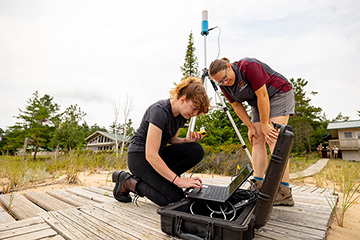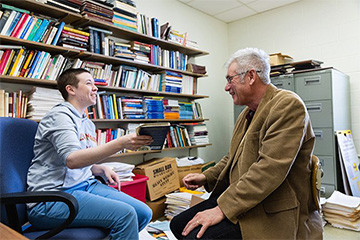College of Medicine takes on the mental health crisis
CMU works to transform how care is delivered
COVID-19 hit a growing need for mental health providers like a bomb. Before the pandemic, mental health providers – including psychiatrists – were retiring faster than their replacements were getting trained.
The pandemic fueled that with at-work stress. More than 60 percent of 2,500 physicians surveyed in 2022 reported at least one instance of burnout during the height of the Omicron variant wave.
“COVID hit so hard in the health professions,” said Alison Arnold, director of the Interdisciplinary Center for Community Health and Wellness. “It created burnout, which led to more early retirements, which made the physician and health care professional shortage worse.”
Central Michigan University’s College of Medicine is tackling Michigan’s multifaceted mental health crisis with people, partnerships and technology.
The growing medical school is recruiting doctors to work in underserved areas with financial incentives. They are using telehealth to reach patients with geography-based access barriers.
The college is also providing support to professionals not directly affiliated with the college through a project to expand broadband access in rural communities. It is also arming those professionals with suicide prevention tools.
Michigan’s unmet mental health need
Data from a leading health policy think tank points to the severity of the challenges. Only one-third of Michigan’s need for psychiatric care is being met, according to a 2022 report from the Kaiser Family Foundation. Of the state’s 10 million people, 5.2 million lack adequate access to mental health care.
Providing that care will require an additional 226 psychiatrists, according to the foundation. They’ll be called to address a range of problems, from patients in need of treatment for mental health crises, suicide prevention, substance abuse and trauma.
It will also require addressing barriers to accessing care. Most of Michigan’s mental health providers are concentrated in southeast Michigan, Arnold said. Solving Michigan’s mental health crisis will also require recognizing the issue of geography.
People living in rural areas are just as likely to suffer from mental illness, but are less likely to receive care for it, according to the 2020 paper “A call to action to address rural mental health disparities.”
“Rural areas are not all the same and encounter unique challenges, whether they are amenity-rich, transitioning or impoverished,” Arnold said. “By tapping into each community’s strengths, it is possible to build supports that can reduce the stigma associated with seeking help for health needs and lead to local solutions that increase access to services.”
“It’s really a health equity issue,” she said.
Expanding broadband to expand access
The college recently embarked on an effort that will determine broadband capacity in several rural Michigan counties and then help develop access.
The project’s first phase involves measuring Internet speed in six rural Michigan counties: Gladwin, Manistee, Missaukee, Montmorency, Osceola and Oscoda. CMU is one of three partners working with the recipient of the federal grant, the Alaska Native Tribes Health Consortium.
The second is part of a $960,000 federal appropriation to build telehealth infrastructure and clinical service capacity for in rural areas.
Improving broadband access in rural areas can bridge gaps in some geographic areas by creating a direct link between a psychiatrist and a patient.




